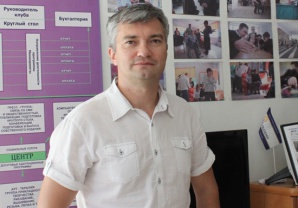
Criminal Liability for Libel and Insult Hinders Battle Against Corruption
04/03/2014
E.Vatlina “Kazakhstan needs Children’s Ombudsman”
05/03/2015In anticipation of ratification of the Convention on the Rights of Persons with Disabilities in Kazakhstan, we initiated a conversation with Mr. Sergey Molchanov, the psychotherapist and a human rights activist from Pavlodar, about the issues facing people with mental disabilities in our country.
In anticipation of ratification of the Convention on the Rights of Persons with Disabilities in Kazakhstan, we initiated a conversation with Mr. Sergey Molchanov, the psychotherapist and a human rights activist from Pavlodar, about the issues facing people with mental disabilities in our country. SFK was interested to know Mr. Molchanov’s opinion if the rights of these particularly vulnerable and segregated groups are observed, and what can be done to improve the situation?
Ainel Kainazarova: Sergey, could you please describe the general situation of people with mental disorders in Kazakhstan?
Sergey Molchanov: Unfortunately, the situation hasn’t changed very dramatically compared to what it was in the Soviet Union. There are mental hospitals in each oblast where people with mental health problems experiencing aggravation of their disease, get some therapy and appear to go into remission and discharged from hospital. There are also mental health treatment institutions where on average 400-450 people undergo medical treatment. I cannot say these facilities provide special rehabilitation due to a lack of qualified psychologists and psychotherapists. As a psychotherapist I can summarize that the situation of people with mental health problems is unsatisfactory.
AK: However, currently Kazakhstan is preparing to ratify the UN Convention on the Rights of Persons with Disabilities. In your opinion, will this ratification contribute to the improved living conditions for people with mental disabilities?
SM: In theory, we must start introducing best international practices on social integration of people with mental health disorders right away, but our poorly developed alternative medical and social services prevent us from doing so. Everything that has been in this sphere so far comes down to the fact that people with mental health disorders are merely hospitalized or put into closed mental health institutions. At the same time the modern science invented many rehabilitation programs that help such people in many countries to work, pay taxes and become productive members of society. They are integrated into society so well, that their disorder is not that obvious. That’s exactly what we should strive for. I am really sad to admit that Kazakhstani people with mental disabilities lack opportunity to go through such rehabilitation. I only know of one case in which the treatment complies with the best international practices – it is the work of Pavlodar club house “Alrami”, which has been providing special care for adults with intellectual/mental disorders. Unfortunately there are very few of other examples.
AK: Speaking of best practices of integration of disabled people into society, which model in your opinion is the most relevant to our situation? What can we take for a basis or what should be done to create our own unique experience?
SM: You know, when I was in Lithuania attending the seminar, the head of an international non-profit foundation “Global Initiative on Psychiatry” shared his country’s experience. I was interested in this topic so much, that I asked too many questions, to which he answered “you should start implementing what you learnt today and even what you didn’t learn.” And he was right to say “why worry about the best practices, if there’s even no minimum standards in respect of people with mental disabilities in our country?”
What can we do today? We can start from opening social rehabilitation centers for people with mental disorders under psychiatric hospitals. In our country we have an excellent vertical power structure and if there is “an order from above” everything might be easily implemented. NGOs also need state support in order to work with people with mental and psychosocial disabilities. Moreover, it is necessary to stimulate setting up a network of clubhouses for people with mental disabilities in Kazakhstan. If such facilities will be funded out of state contracting, and there will be investments in professional development and training for their employees, then people with mental disabilities will be given an opportunity to choose a club house they would like to attend.
It is obvious that the growth of alternative forms of service delivery will cause a reduction in the number of psychiatric clinics, as well as the number of severe disorders. Along with the emerging initiative groups and self-help groups the new social rehabilitation departments will be created in hospitals, and people with mental disabilities will be better adapted to live in our society. This, of course, is an ideal picture, but I am an optimist.
AK: Thank you very much, Sergey.

